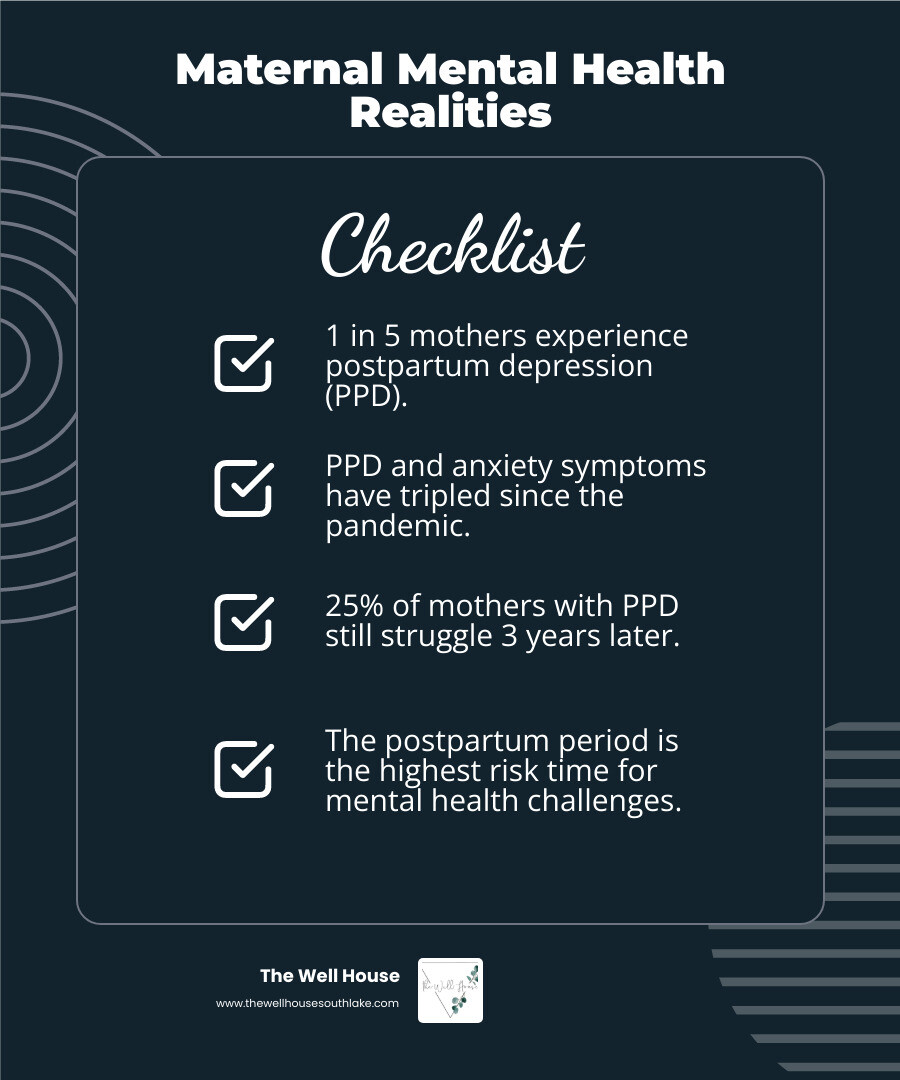Mom’s Mental Health Matters: Exploring Counselling Services
Why Motherhood Mental Health Deserves Professional Support
Counselling for mothers provides specialized support for the emotional, psychological, and identity challenges of motherhood. Maternal counselling offers:
- Professional guidance for postpartum depression, anxiety, and other perinatal mood disorders
- Identity work to help you refind yourself beyond motherhood
- Coping strategies for overwhelm, guilt, and the “mental load”
- Relationship support to strengthen bonds with partners and children
- Safe space to process difficult experiences without judgment
Becoming a mother is a profound change, but it often brings unexpected challenges. Statistics show that 1 in 5 mothers experience postpartum depression, with symptoms tripling since the pandemic. It’s normal to feel overwhelmed or like you’ve lost touch with yourself.
Seeking support is a sign of strength. Therapy offers professional, evidence-based strategies in a confidential space, providing tools for healing that friends and family can’t.
I’m Jennifer Kruse, a Licensed Professional Counselor Supervisor specializing in motherhood support. My approach to counselling for mothers combines compassionate guidance with practical strategies to help you find balance, purpose, and joy.

Quick look at counselling for mothers:
The Unspoken Realities of Motherhood
Behind the picture-perfect photos of motherhood lies a complex reality. The transition, known as “matrescence,” is a major identity shift affecting every part of your life.

The “invisible load” of managing appointments, worrying about development, and handling body changes is exhausting. Society expects constant joy, but it’s normal to feel overwhelmed and lost. If this sounds familiar, know that seeking support for Coping with Motherhood is a sign of strength.
Emotional and Mental Problems Mothers Face
Each stage of motherhood brings unique challenges. During pregnancy, anxiety about the baby’s health or your parenting abilities is common. After birth, hormonal changes and sleep deprivation can intensify these struggles, leading to:
- Anxiety and low mood: Persistent worry or sadness that lingers.
- Loneliness: Feeling misunderstood, even by friends and family.
- Body image struggles: Feeling disconnected from your post-birth body.
- Identity shift: Losing touch with who you were before becoming a mom.
- Career and relationship changes: Navigating stress at work and shifts in your partnership. For those without a partner, Single Mom Counseling offers specialized support.
- Past trauma: Healing from difficult birth experiences, miscarriage, or infertility.
Signs You Might Benefit from Therapy
You don’t need a diagnosis to benefit from counselling. However, professional support is especially helpful if you experience:
- Persistent sadness, irritability, or feeling overwhelmed by Motherhood Responsibilities.
- Difficulty bonding with your baby.
- Excessive worry or panic attacks.
- Loss of interest in activities you once enjoyed.
- Significant changes in sleep or appetite.
- Feelings of worthlessness or constant guilt.
- Thoughts of harming yourself or your baby (please seek immediate help).
Reaching out is about giving yourself and your family the best chance to thrive.
Why Professional Counselling for Mothers is a Game-Changer
Counselling for mothers is a lifeline, offering more than just a place to talk—it’s a space to create lasting change. A trained therapist provides a non-judgmental environment to gain perspective, develop effective coping mechanisms, and feel empowered. When life feels out of control, Mom Therapy for When Life is Out of Control can help you find your footing.
A Confidential Space vs. Friendly Advice
While friends mean well, their advice can sometimes feel overwhelming. A therapist offers something different: professional boundaries, an unbiased perspective, and evidence-based strategies. Sessions are focused entirely on your needs, guiding you toward your own solutions rather than telling you what to do. This confidential space allows for deeper exploration of issues without fear of judgment. For this kind of support, Mother Therapy provides the specialized care you deserve.
Reclaiming Your Identity and Finding Balance
It’s common to feel like you’ve lost yourself in motherhood. Therapy helps you steer this identity shift by integrating personal goals back into your life. This isn’t selfish—it’s human. We work on realistic time management, prioritizing self-care, and refinding passions outside of motherhood. If your relationship with your own mother impacts your parenting, a Mother Wound Therapist can help you heal old patterns.
Strategies for Overcoming “Mom Guilt” and Shame
Mom guilt is exhausting. Therapy helps by:
- Identifying triggers: Understanding what causes feelings of guilt and shame.
- Challenging negative self-talk: Questioning the harsh inner critic.
- Practicing self-compassion: Treating yourself with kindness.
- Setting healthy boundaries: Protecting your energy by saying “no” without guilt.
- Reframing expectations: Embracing the “good enough” mother concept, which liberates you from the impossible standard of perfection.
Specialized Support for Perinatal Mood and Anxiety Disorders (PMADs)
The perinatal period is one of the most vulnerable times for a woman’s mental health. Statistics show 1 in 5 mothers experience postpartum depression, and rates of anxiety and depression have tripled since the pandemic.
If you’re struggling, please know it’s not your fault. Perinatal mood and anxiety disorders (PMADs) are legitimate medical conditions that respond well to treatment. You are not alone, and with support like our Postpartum Support Help for Depression and Anxiety, recovery is possible.
Understanding PPD, PPA, and Other PMADs
PMADs are serious conditions that go beyond the “baby blues.” They can develop during pregnancy or up to a year after birth. They include:
- Postpartum Depression (PPD): Intense sadness, hopelessness, and fatigue that interfere with daily life.
- Postpartum Anxiety (PPA): Constant, racing worries, and potential panic attacks.
- Other conditions: Postpartum OCD (intrusive thoughts and compulsions), birth trauma, and postpartum rage.
Intrusive thoughts—unwanted, disturbing thoughts about your baby—are common and do not make you a bad mother. Our Postpartum Support for Moms addresses all these conditions with expertise.
Key benefits of counselling for mothers with PMADs
Counselling offers a structured path back to feeling like yourself. Key benefits include:
- Symptom management: Strategies to reduce the intensity of depressive or anxious symptoms.
- Emotional regulation skills: Learning to manage intense emotions before they become overwhelming.
- Personalized coping strategies: A toolkit for managing stress, improving sleep, and practicing self-care.
- Processing difficult birth experiences: Healing from birth trauma in a safe environment.
- Coordinated care: We work with your medical providers, and can connect you to resources like the National Maternal Mental Health Hotline (1-800-944-4773).
With professional help, you will feel better.
Strengthening Your Village: How Therapy Improves Family Relationships
When a mother feels emotionally healthy, the positive effects ripple out to her entire family. Counselling for mothers strengthens the bonds that hold families together.
When you have the tools to manage stress and communicate your needs, you become more patient and present. Therapy helps mothers develop stronger communication and conflict resolution skills, changing family dynamics. Our Parent Coaching Expert Guidance focuses on creating a supportive home where everyone can thrive.
Enhancing Partner Communication and Connection
The transition to parenthood tests even the strongest relationships. Sleep deprivation and new responsibilities can lead to misunderstandings and resentment. Counselling helps couples steer this strain by learning to share the mental load, rebuild intimacy, and develop effective co-parenting strategies. Learning to express needs effectively is a valuable skill that can restore your connection. Our Parenting Classes for Couples provide structured support for strengthening your partnership.
Nurturing the Parent-Child Bond
A secure attachment with a primary caregiver is the foundation for a child’s emotional development. You don’t have to be perfect; you just have to be present and responsive. Understanding child development can reduce frustration and help you respond with patience. Therapy can strengthen this bond, whether through Mommy and Me Therapy, improving the Mother and Daughter Relationship, or learning effective Parenting Strategies for Discipline. We also offer Mom and Son Therapy to address the unique dynamics of that relationship. When you care for your own mental health, you give your children the gift of a more present, attuned parent.
Finding Your Path to Wellness
Taking the first step toward seeking support is a powerful act of self-care for you and your family. You deserve to feel joyful in your motherhood journey, and finding the right help is possible. Explore The Ultimate Guide to Therapy Options for Moms to understand your choices.
Finding the right type of counselling for mothers
Just as every mother is unique, so are the therapeutic approaches that can help. At The Well House, we use a collaborative, holistic approach. Your therapist will work with you to find the right modality, which may include:
- Cognitive Behavioral Therapy (CBT): To change negative thought patterns.
- Dialectical Behavior Therapy (DBT): To manage intense emotions and stress.
- Interpersonal Therapy (IPT): To improve relationships and social functioning.
- Somatic Therapy: To release stress stored in the body.
- EMDR (Eye Movement Desensitization and Reprocessing): To process trauma, such as a difficult birth.
- Attachment-based therapy: To build secure, healthy relationships.
Your therapist will tailor the approach to your specific needs and goals.
How to Find a Qualified Maternal Health Therapist
Finding the right therapist is crucial. Start by using online directories like the Postpartum Support International Provider Directory, which lists specialists in perinatal mental health. Ask for referrals from your OB-GYN or pediatrician.
When considering a therapist, ask about their experience with maternal mental health and verify their credentials. Specialization is important, as a therapist who understands motherhood’s unique challenges can provide more effective support. Trust your instincts during a consultation; the connection you feel is essential for effective counselling for mothers.
Finding Your Path to Wellness
Taking the first step toward support is a powerful act of self-care. You deserve to feel well on your motherhood journey, and finding the right fit is possible. We encourage you to explore The Ultimate Guide to Therapy Options for Moms to understand your choices.
Finding the right type of counselling for mothers
We believe in a collaborative, holistic approach. The best therapeutic modality depends on your unique needs.
| Therapeutic Approach | Focus |
|---|---|
| Cognitive Behavioral Therapy (CBT) | Helps identify and change negative thought patterns that contribute to depression, anxiety, and guilt. Perfect for mothers struggling with “mom guilt” or overwhelming worry. |
| Dialectical Behavior Therapy (DBT) | Teaches emotional regulation skills and distress tolerance – invaluable for managing the intense emotions that come with motherhood. |
| Interpersonal Therapy (IPT) | Focuses on improving relationships and communication skills, helping mothers steer changes in their partnerships and family dynamics. |
| Somatic Therapy | Addresses how trauma and stress are stored in the body, particularly helpful for mothers dealing with birth trauma or chronic stress. |
| EMDR for Trauma | Specifically designed to process traumatic experiences, including difficult births, pregnancy loss, or childhood experiences affecting your parenting. |
| Attachment-Based Therapy | Strengthens the bond between mother and child while helping you understand your own attachment patterns and how they influence your parenting. |
At The Well House, we work with you to determine which approach feels right, sometimes combining methods as your needs evolve.
How to Find a Qualified Maternal Health Therapist
To find the right therapist, start with specialized directories like the Postpartum Support International Provider Directory. Ask for referrals from your OB-GYN, pediatrician, or other mothers.
When you connect with a potential therapist, ask about their experience with perinatal mental health and verify their credentials. Finding a Maternal Health Therapist who specializes in motherhood is key. Trust your instincts during the consultation—the relationship is crucial for healing.
The Unspoken Realities of Motherhood
The reality of motherhood is often messy and overwhelming–and that’s normal. The transition, known as “matrescence,” is as significant as adolescence, shifting your body, relationships, and identity.
The “invisible load” of managing a household and a child’s needs is heavy, and the pressure to be a “perfect mom” is crushing. It’s no wonder so many mothers feel lost or like they’re failing. If you’re struggling, learning strategies for Coping with Motherhood can make a huge difference.
Emotional and Mental Problems Mothers Face
The emotional rollercoaster of motherhood is intense. Common struggles include:
- Anxiety and low mood: Persistent worry or sadness that’s hard to shake.
- Loneliness and isolation: Feeling profoundly alone, even when surrounded by people.
- Body image struggles: Feeling disconnected from your post-childbirth body.
- Identity shift: Wondering who you are beyond being “Mom.”
- Career and relationship stress: Navigating professional adjustments and changes in your partnership. Single Mom Counseling provides specialized support for those parenting alone.
- Unprocessed trauma: Healing from difficult birth experiences, miscarriage, or infertility.
Signs You Might Benefit from Therapy
You don’t need to be in crisis to benefit from therapy. However, professional support is especially helpful if you experience:
- Persistent sadness or irritability.
- Feeling completely overwhelmed by Motherhood Responsibilities.
- Difficulty bonding with your baby.
- Excessive worry or panic attacks.
- Loss of interest in things you once enjoyed.
- Significant changes in sleep or appetite.
- Constant feelings of worthlessness or guilt.
- Any thoughts of harming yourself or your baby (this requires immediate professional help).
Seeking support is a sign of strength and a commitment to your well-being.
Why Professional Counselling for Mothers is a Game-Changer
Professional counselling for mothers offers a dedicated, non-judgmental space that is entirely yours. Unlike friendly advice, therapy is confidential and custom to your specific needs.
A therapist provides an unbiased perspective, helping you gain clarity and develop coping mechanisms that work. They empower you to find your own solutions, which is invaluable when life feels out of control. Our Mom Therapy for When Life is Out of Control provides the structure and tools to regain your footing.
A Confidential Space vs. Friendly Advice
While friends offer support, a therapist provides something more: a safe space bound by confidentiality. They use evidence-based strategies to help you get to the root of your challenges and create lasting change. This focus on your individual needs allows for deeper exploration than casual conversations permit. Mother Therapy ensures you have an expert by your side who understands the unique challenges of motherhood.
Reclaiming Your Identity and Finding Balance
Many mothers feel they’ve lost their identity. Counselling helps you steer this shift by exploring ways to integrate your personal goals and passions back into your life. This isn’t selfish; a fulfilled mother is better equipped to care for her family. We help you develop realistic strategies to meet your children’s needs while fostering your own sense of self. If past experiences are impacting you, a Mother Wound Therapist can be incredibly healing.
Strategies for Overcoming “Mom Guilt” and Shame
Therapy offers concrete strategies to manage mom guilt. We work on:
- Identifying triggers: Pinpointing what sparks your guilt.
- Challenging negative self-talk: Reframing your harsh inner critic.
- Practicing self-compassion: Treating yourself with kindness.
- Setting healthy boundaries: Protecting your energy and well-being.
- Reframing expectations: Letting go of the “perfect mother” myth and embracing the “good enough” mother.
Specialized Support for Perinatal Mood and Anxiety Disorders (PMADs)
The journey through pregnancy and the first year postpartum is when you are most vulnerable to mental health challenges. The statistics paint a clear picture: 1 in 5 mothers experience postpartum depression, and since the pandemic, symptoms of depression and anxiety have tripled among new moms.
If this is your reality, please know you haven’t failed. These are real medical conditions that require professional support. You are absolutely not alone, and with help like our Postpartum Support Help for Depression and Anxiety services, recovery is expected.
Understanding PPD, PPA, and Other PMADs
PMADs are serious conditions, not just the “baby blues.” They include:
- Postpartum Depression (PPD): Intense hopelessness and fatigue that disrupt daily life.
- Postpartum Anxiety (PPA): Constant, racing worry and a sense of dread.
- Postpartum Obsessive-Compulsive Disorder: Terrifying, intrusive thoughts about harm coming to the baby.
- Birth trauma: Lasting emotional impact from a difficult birth experience.
- Postpartum rage: Intense, uncontrollable anger that feels out of character.
Our comprehensive Postpartum Support for Moms addresses all of these conditions with understanding and expertise.
Key benefits of counselling for mothers with PMADs
Counselling gives you back your sense of self. Benefits include:
- Symptom management: Concrete strategies to reduce depression and anxiety.
- Emotional regulation: Learning to manage intense emotions so they don’t control you.
- Developing coping strategies: Building a toolkit for stress, sleep, and realistic self-care.
- Processing difficult birth experiences: Healing from trauma in a safe space.
- Medication support coordination: We work with your medical providers and connect you to resources like the National Maternal Mental Health Hotline (1-800-944-4773), which provides 24/7 support.
With professional help, you will feel better. Recovery is not just possible; it’s what we expect.
Strengthening Your Village: How Therapy Improves Family Relationships
When you’re feeling better, everyone around you benefits. That’s the beautiful truth about maternal mental health – a mother’s well-being creates a powerful ripple effect that touches every corner of family life. Your healing journey doesn’t just transform your own experience; it strengthens your entire household.
When you have the tools to manage your emotions, you show up as the mother and partner you want to be. Counselling for mothers helps you develop better communication skills and build stronger connections. Through our Parent Coaching Expert Guidance, we help you create the supportive, understanding home you’ve always wanted.
Enhancing Partner Communication and Connection
Motherhood tests even the strongest partnerships. Exhaustion and new responsibilities can lead to disconnection and resentment. Marriage counseling provides a safe space to be heard and understood. We help couples steer relationship strain by learning to share the mental load, rebuild intimacy, and develop effective co-parenting strategies. Our Parenting Classes for Couples offer structured support for strengthening your partnership.
Nurturing the Parent-Child Bond
Your relationship with your child is the foundation of their entire emotional development. Children thrive when they feel safe, seen, soothed, and secure with their primary caregivers. Counselling for mothers can profoundly impact this vital connection by helping you understand your child’s needs and respond in ways that build security and trust.
Understanding child development is incredibly helpful for reducing frustration and building empathy. We offer several ways to strengthen this connection, including Mommy and Me Therapy, support for the Mother and Daughter Relationship, and guidance on Parenting Strategies for Discipline. We also offer Mom and Son Therapy to address those unique dynamics. Caring for your mental health is the greatest gift you can give your children.
Finding Your Path to Wellness
Taking the first step toward support is a powerful act of self-care. You deserve to feel confident and joyful in motherhood, and finding the right help is possible. We encourage you to explore The Ultimate Guide to Therapy Options for Moms to understand your choices.
Finding the right type of counselling for mothers
At The Well House, we use a collaborative, holistic approach. We offer various evidence-based modalities and will find the right one for you:
- Cognitive Behavioral Therapy (CBT): To change negative thought patterns.
- Dialectical Behavior Therapy (DBT): To learn emotional regulation skills.
- Interpersonal Therapy (IPT): To address relationship challenges.
- EMDR (Eye Movement Desensitization and Reprocessing): To process traumatic memories, like a difficult birth.
- Somatic Therapy: To release stress and trauma stored in the body.
- Attachment-based therapy: To build secure bonds and heal past wounds.
How to Find a Qualified Maternal Health Therapist
Finding the right therapist is key. Start with directories like the Postpartum Support International Provider Directory. Ask for referrals from your OB-GYN, pediatrician, or other mothers.
When you speak with a potential therapist, verify their credentials and ask about their specific experience with maternal mental health. The importance of this specialization cannot be overstated. A therapist who understands the unique pressures of motherhood will be much more effective. Our Maternal Health Therapist services are designed specifically for mothers who need specialized, compassionate support. Trust your gut—finding the right fit is worth the effort.
Insurance & Payment Options at The Well House Southlake
At The Well House Southlake, we believe that quality mental health care should be both accessible and affordable. Whether you’re seeking therapy, couples counseling, or online sessions, our goal is to make it easy for you to access therapy that takes insurance and supports your unique needs.
We currently accept:
- Blue Cross Blue Shield (BCBS)
- Aetna
- United Health care (UHC)
- Self-Pay and Out-of-Network Options
If you’re exploring counseling that takes insurance or need help verifying your coverage, our team will guide you through each step — from confirming your benefits to booking your first session. We’re committed to making your experience simple and stress-free, so you can focus on what matters most: your well-being.












